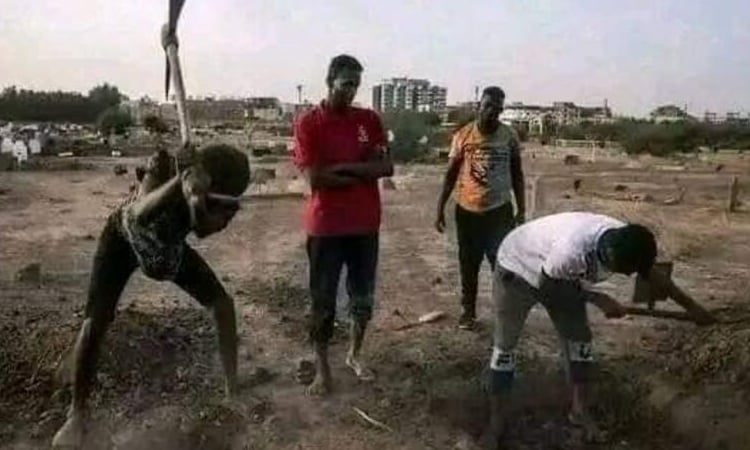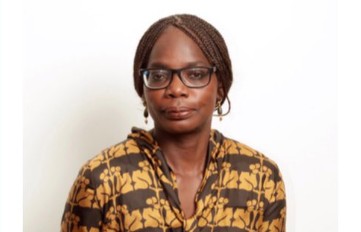
KHARTOUM, Aug 9 (NNN-AGENCIES) — In Sudan’s war-scarred capital Khartoum, Red Crescent volunteers have begun the grisly task of exhuming the dead from makeshift plots where they were buried during the fighting so their families can give them a proper funeral.
Teams of workers in dust-streaked white hazmat suits comb vacant lots, looking for the spots where survivors say they buried their loved ones.
Mechanical diggers peel back layers of earth under the watchful eye of Hisham Zein al-Abdeen, head of the city’s forensic medicine department.
“We’re finding graves everywhere — in front of homes, inside schools and mosques,” he said, surveying the scene.
“Every day we discover new ones.”
Here, in the southern neighbourhood of Al-Azhari, families buried their loved ones wherever they could, as fighting raged between the regular army and the paramilitary Rapid Support Forces (RSF).
When war broke out in April 2023, the RSF quickly swept through Khartoum, occupying entire districts as residents fled air and artillery bombardments and street fighting.
In March, the army and its allies recaptured the capital in a fierce offensive.
It is only now, after the front lines of the conflict moved elsewhere, that bereaved families can give their loved ones a proper burial.
“My daughter was only 12,” said Jawaher Adam, standing by a shallow makeshift grave, tears streaming down her face.
“I had only sent her out to buy shoes when she died. We couldn’t take her to the cemetery. We buried her in the neighbourhood,” she said.
Months on, Adam has come to witness her daughter’s reburial — this time, she says, with dignity.
Each body is disinfected, wrapped and labelled by Red Crescent volunteers before being transported to Al-Andalus cemetery, 10 kilometres away.
“It’s painful,” said Adam, “but to honour the dead is to give them a proper burial.”
Many of the war’s deadliest battlegrounds have been densely populated residential districts, often without access to hospitals to care for the wounded or count the dead.
That has made it nearly impossible to establish a firm death toll for the war.
Former US envoy Tom Perriello has said that some estimates suggest up to 150,000 people were killed in the conflict’s first year alone.
In the capital, more than 61,000 people died during the first 14 months of war — a 50 percent increase on the pre-war death rate — according to the London School of Hygiene and Tropical Medicine.
Of those deaths, 26,000 were attributed to violence.
At first glance, the vacant lot in Al-Azhari where Red Crescent volunteers are digging seems to be full of litter — pieces of wood, bricks, an old signpost.
Look more closely, however, and it becomes clear they have been placed in straight lines, each one marking a makeshift grave.
Volunteers exhumed 317 graves in that one lot, Zein al-Abdeen said.
Similar mass graves have been uncovered across the capital, he said, with 2,000 bodies reburied so far.
But his team estimates there could be 10,000 bodies buried in makeshift graves across the city.
At the exhumation site, grieving mothers watch on silently, their hands clasped tightly to their chest.
They, like Adam, are among the lucky few who know where their loved ones are buried. Many do not.
At least 8,000 people were reported missing in Sudan last year, in what the International Committee of the Red Cross says is only “the tip of the iceberg”.
For now, authorities label unclaimed bodies, and keep their details on file.
With the bodies now exhumed, the community can have some degree of closure, and the vacant lot can be repurposed.
“Originally, this site was designated as a school,” said Youssef Mohamed al-Amin, executive director of Jebel Awliya district.
“We’re moving the bodies so it can serve its original purpose.”
The United Nations estimates that up to two million people may return to Khartoum state by the end of the year — but much depends on whether security and basic services can be restored.
Before the war, greater Khartoum was home to nine million people, according to the UN Development Programme, but the conflict has displaced at least 3.5 million.
For now, much of the capital remains without power or running water, as hospitals and schools lie in ruins. — NNN-AGENCIES





